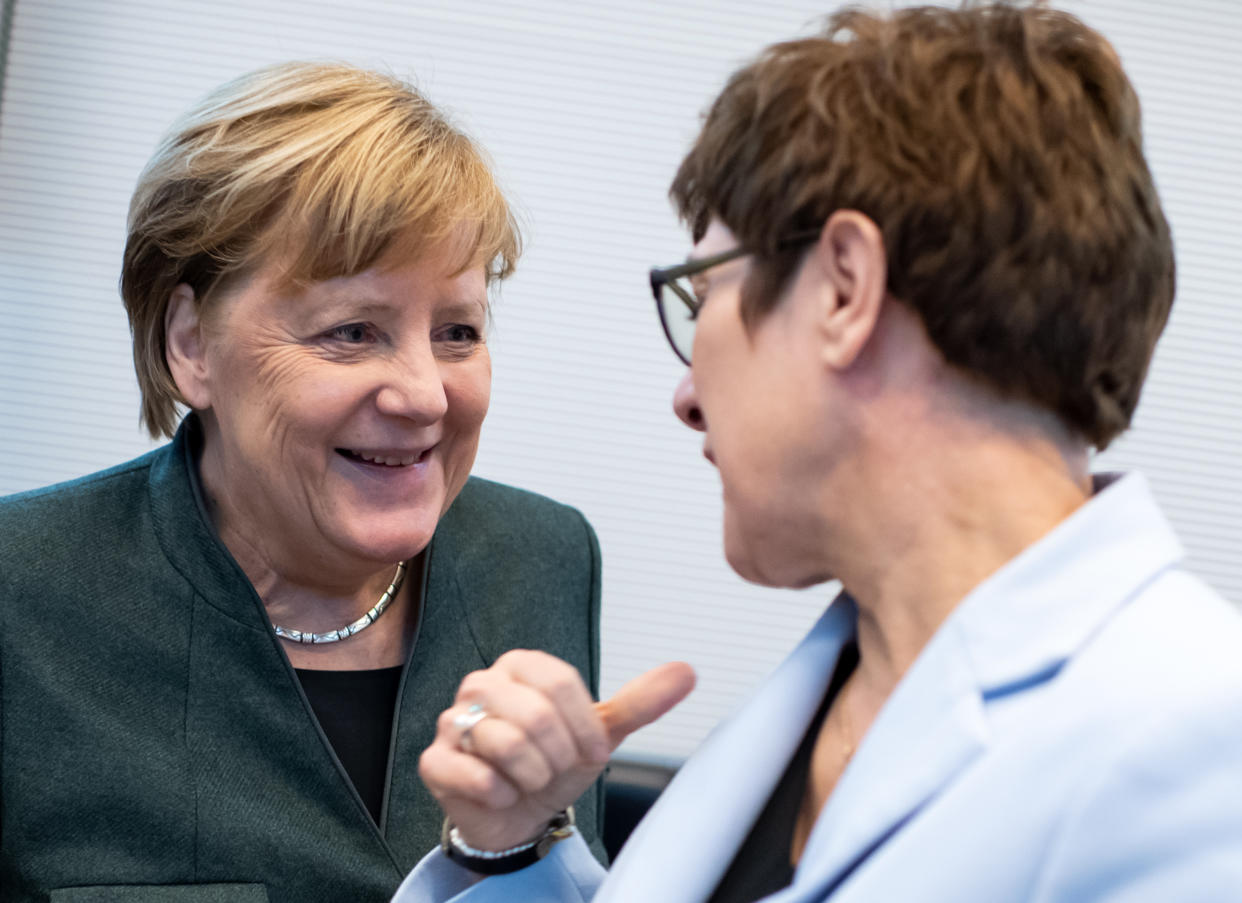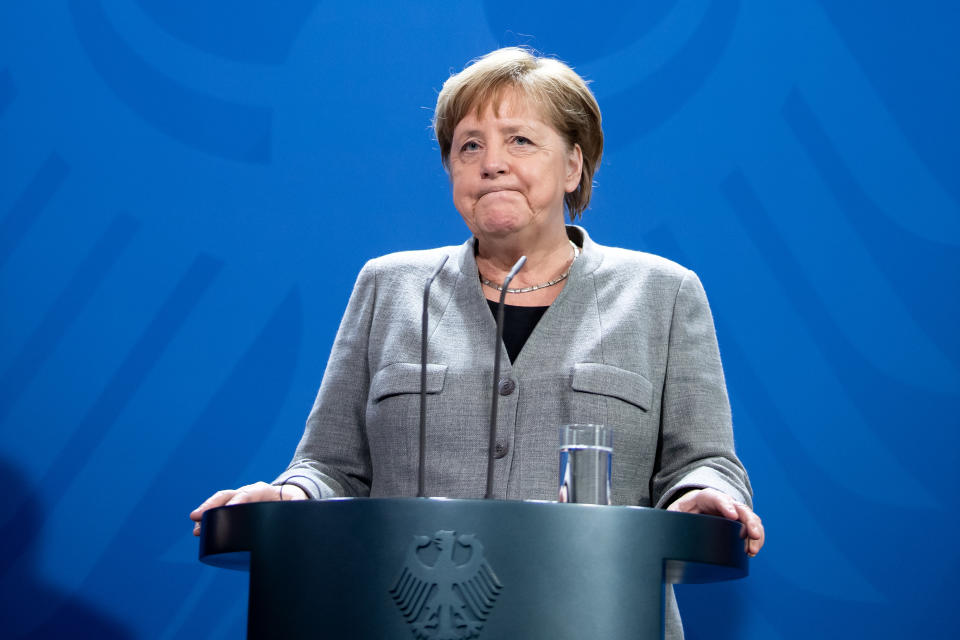What’s next for Germany now Merkel's succession plan has shattered?

“Is Germany ready for a male chancellor?” “Is the CDU modern enough for a gay chancellor?” “Merkel should go”... The headlines in German papers over the last week reflect the confusion unleashed after Annegret Kramp-Karrenbauer quit as leader of the Christian Democrats (CDU) and triggered a crisis in the country’s ruling centre-right party.
Kramp-Karrenbauer, Angela Merkel’s hand-picked heir to lead the CDU and stand as its next chancellor candidate in 2021, resigned days after a political scandal in the eastern state of Thuringia.
Defying the party’s promise to never cooperate with the far-right Alternative for Germany (AfD) party, the Thuringia CDU had lined up with the AfD to vote in a new state premier. Outrage quickly ensued, with protestors taking to the streets to slam the CDU, and Free Democrat Thomas Kemmerich who won the vote thanks to AfD support.
READ MORE: German state premier resigns after outrage over far-right support
The country now faces months of political uncertainty until the CDU elects a new leader in December. However, it could also spell an early end to Merkel’s fourth and final term, or trigger snap elections before the planned general election in Autumn 2021.
The CDU, which has ruled Germany in different coalition constellations for 50 out of the last 70 years, has plunged deeper into disarray. It was already in the throes of an identity crisis, with some members wanting it to move further to the right and recapture voters who have gone to the AfD, while others support its more centrist policies under Merkel, and fear leaning more right will alienate liberal supporters.
While it won her much respect at home and abroad, Merkel’s open-door policy during the height of the refugee crisis in 2016 drew harsh criticism from many in the CDU, including from her interior minister Horst Seehofer. It also drove many life-long CDU voters towards the anti-immigrant, anti-Muslim, nationalism of the AfD.
AKK not OK

Kramp-Karrenbauer, or AKK as she is called in Germany, has not shone since taking over party leadership in 2018. Merkel’s decision to step down as chairwoman after the CDU suffered heavy losses in several state elections but still carry on as chancellor was unusual — normally the two roles have been carried out by the same person — and people wondered if Kramp-Karrenbauer would succeed in Merkel’s shadow.
Merkel backed the former premier of the Saarland in the hopes she would reunite and reinvigorate the party. The chancellor’s chess moves may not have played off as planned, considering the current chaos in the CDU.
READ MORE: Merkel’s chess: Von der Leyen wins Europe, AKK gets German defence role.
Kramp-Karrenbauer has made a number of missteps in her relatively short time as party boss. In November, she threatened to quit if the party continued to squabble and not get behind her.
“Kramp-Karrenbauer was elected by such a small majority, and her approval ratings have been disastrous,” said Thorsten Faas, a political science professor at the Free University of Berlin. “What happened in Thuringia made it very clear that she lacks authority in her party — and the chancellor then threw her authority onto the scales … which may not have made the situation easier [for AKK].”
Merkel, who has avoided commenting on how AKK is doing her job and even defended some of her gaffes, this week harshly condemned the CDU over the far-right fiasco, calling its actions in Thuringia “unforgivable.”
No appetite for snap elections
In an interview with Reuters TV on Wednesday, Kramp-Karrenbauer, who is staying on until a new leader is chosen, said that she does not believe the stability of the coalition government is at risk. She pointed out that “we currently have a chancellor and a government... which is also preparing for the EU Council Presidency."
However, she added that the EU was going through “very turbulent times” and, especially in the final phase of Brexit negotiations, it was important to have a “capable and stable" Germany. Europe’s biggest economy has often been accused of not stepping up more in terms of EU leadership, for example, appearing to drag its feet on reforms. It is pretty certain that the CDU debacle will not make it any more outward-looking.
Former Social Democrat (SPD) vice chancellor Sigmar Gabriel told the Bild that he suspects it “won’t be long before there will be new elections.” But both the CDU and its junior coalition partner the SPD are doing disastrously in the polls, and could face an absolute drubbing were fresh elections to be called right now.
Merkel bows out?

Despite frequent predictions that the chancellor would quit or be forced to quit, she has weathered crisis after crisis during her 15 years at the helm. A senior lawmaker from the Social Democrats indicated that breaking up the government was not on the cards — as long as Merkel did not quit early.
“We went into this coalition with her. And we will also leave this coalition again with her,” SPD general secretary Lars Klingbeil said in an interview (link in German).
Merkel is still by far the country’s most popular politician, with some recent polls showing her with up to a two-thirds approval rating.
Although there are few calls for her to step down, her move to manoeuvre Kramp-Karrenbauer in as her successor has been criticised as control-freakery and counter to how democratically elected leaders should operate. Kramp-Karrenbauer’s failure to unite the party underlines that Merkel’s succession plan has not worked.
"To me, this failure is symptomatic of the way Angela Merkel has exercised power," Henrik Enderlein, president of the Hertie School of Governance in Berlin, told CNN. "She never allowed anyone to rise within the federal government and become a natural heir."
Men in waiting
Currently one of the candidates throwing his hat in the ring to lead the CDU and be its next chancellor candidate is Friedrich Merz, who is no fan of Merkel.

Merz is a corporate lawyer by training and was formerly a parliamentary floor leader before Merkel forced him out in 2002. Openly critical of the chancellor and what he calls her “failed” leadership he would be keen to shift the party to the right. If he were chosen, it would be hard for Merkel to finish out her term.
He lost out to Kramp-Karrenbauer in the CDU leadership vote in 2018, but has recently announced he is resigning from his supervisory-board job at BlackRock investment company to devote himself to the party.
North-Rhine Westphalia state premier Armin Laschet is also contender for CDU chief. Laschet is a popular premier in Germany’s most populous state. He is closely aligned with Merkel’s policies and a fan of the chancellor
Health minister Jens Spahn, who vied with AKK and Merz for the party leadership vote in 2018 and came in third, is also an option. Spahn is the youngest of the bunch at 39, and has also been critical of Merkel’s refugee policies in the past.
“After being shaped by Angela Merkel for so many years, the CDU needs to learn to walk again," Spahn told Spiegel this week. “The CDU has to be configured for the future, with the chancellor no longer at the centre.”
Whoever takes over the CDU and runs for chancellor will still need to deal with the fact that the far-right AfD is present in every state parliament and the main opposition party in the federal parliament, and will keep sewing disruption and division like in Thuringia.

 Yahoo News
Yahoo News 
